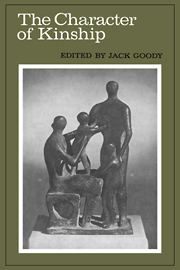Book contents
- Frontmatter
- Contents
- Dedication
- Introduction
- KINSHIP AND DESCENT
- THE NATURE OF KINSHIP
- Genetrix: Genitor:: Nature: Culture?
- The Long Term and the Short Term: the Economic and Political Significance of the Morality of Kinship
- The Kith and the Kin
- THE NATURE OF THE FAMILY
- MARRIAGE AND AFFINAL ROLES
- Bibliography of the Writings of Meyer Fortes
- References
- Index
The Long Term and the Short Term: the Economic and Political Significance of the Morality of Kinship
Published online by Cambridge University Press: 07 May 2010
- Frontmatter
- Contents
- Dedication
- Introduction
- KINSHIP AND DESCENT
- THE NATURE OF KINSHIP
- Genetrix: Genitor:: Nature: Culture?
- The Long Term and the Short Term: the Economic and Political Significance of the Morality of Kinship
- The Kith and the Kin
- THE NATURE OF THE FAMILY
- MARRIAGE AND AFFINAL ROLES
- Bibliography of the Writings of Meyer Fortes
- References
- Index
Summary
There have been few aspects of Fortes' views on kinship which have been so often criticised as his insistence on the ‘morality’ of kinship, its ‘irreducibility’ or its ‘prescriptive altruism’. His insistence has been that socialisation, and perhaps also instinct in a very wide sense, means that individuals are willing to forego their political and economic interest for the sake of the good. His critics, Worsley (1956), Leach (1961a) and others, have refused to recognise, or have minimised, the notion of morality as having a force of its own and have chosen to see the kind of ethnographic facts referred to by Fortes as a front for ‘what it really is all about’, that is, the interest of the parties concerned. In this, these writers have adopted the traditional assumption of functionalist arguments that the cause of social facts is the result of the uses to which they are put. However, if we chose to abandon such a teleological position which confuses effect with cause (see Jarvie 1965) then the two sides of the polemic stop joining. For if motive and effect are not identical, there is no problem in seeing ‘morality’ as an essential aspect of the actor's motive while the effect is entirely other, an observation of the scientist whose value depends on his methods of observation and his categories of measurement which when dealing with such facts as the distribution of goods and services is not likely to include ‘morality’.
- Type
- Chapter
- Information
- The Character of Kinship , pp. 75 - 88Publisher: Cambridge University PressPrint publication year: 1974
- 11
- Cited by



